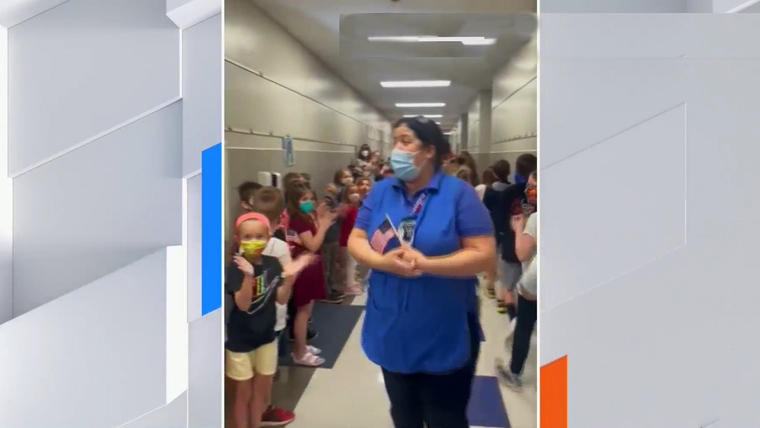By Phil McCausland - NBC News
Democratic lawmakers will introduce a bill Wednesday night to make permanent the temporary summer food program for children created by the COVID-19 pandemic crisis.
The proposed law would consolidate and slightly expand a program first created within the American Rescue Plan that provides cash for some 33 million children from low-income families.
Earlier this year, the Biden Administration called it
"the largest summer food program in American history
.
"
[A Florida school edits pictures from the yearbook to cover the girls' breasts]
The measure would also secure a portion of the expanded social safety net the country has developed during the national emergency created by the coronavirus pandemic, just as some Republican states are beginning to cut back on such benefits.
"We have seen lines stretching for miles at food banks across the country over the past year. This pandemic has to be a wake-up call for the United States," said Senator Patty Murray, a Washington Democrat who will introduce the bill. law.
"Hunger doesn't take vacations when schools are closed, so neither do we," he added.
A Latina is voted 'Teacher of the Year 2021' among all US state schools.
May 7, 202103: 29
The current program provides families of children eligible for free or reduced-price lunches an electronic benefits transfer card, which is, in essence, a debit card with a fixed amount of money to buy food when youth are not in attendance. school in the summer.
This new program will be expanded to include all holidays or when schools operate remotely or on a hybrid model.
Sen. Patty Murray, D-Washington, will introduce the Stop Child Hunger bill.Greg Nash / Pool via AP
The amount that families who would receive the Electronic Benefit Transfer (EBT) would not be less than the value of the meals that they would normally receive through a free or reduced price lunch at school, according to the legislation .
The amount is likely to be set each October by the US Department of Agriculture (USDA).
[This girl was about to die. He received thousands of dollars and gifts. But her illness could have been her mother's invention]
This summer it will be around $ 375, or nearly $ 7 a day during the months the kids aren't in school.
Murray will join Representatives Mike Levin, D-California, and Jahana Hayes, D-Connecticut, in introducing the bills in the Senate and House of Representatives, respectively, this Wednesday.
The bill, called Stop Child Hunger, would effectively convert and expand the pandemic's summer EBT program to replace the USDA's summer feeding initiatives, which have long been criticized by economists and even by those who run them.
"Each year, we run one of the USDA's Summer Food Service Programs, which is primarily focused on lunch. We will serve several thousand children, but it is a fraction of the amount they receive meals during the school year." said Michael Flood, president of Los Angeles Regional Food.
"We can see how every year there is a program design problem," he added.
[The Latina mother accused of killing her three children in Los Angeles confesses her crime: "Do I wish I hadn't done that? Yes"]
A Senate staff member who worked on the legislation and asked to remain anonymous to speak freely about the program said it would cost about $ 8 billion annually, citing an analysis prepared for Murray's office by an outside group.
The USDA estimated that the new summer program would cost about $ 12 billion annually
.
Murray, who serves as chair of the Senate Committee on Health, Education, Labor and Pensions, has lobbied for similar legislation since 2014. Her office sees a rare window to pass the bill in the coming months.
"We think we have the best chance since we introduced the bill in 2014," said the staff member who worked on the legislation.
"The two tracks are through the infant nutrition reauthorization or the infrastructure package."
The Child Nutrition Act, which covers many of the food programs that feed low-income families, is pending reauthorization this year.
While it has received bipartisan support in the past, it has not been fully reauthorized in recent years due to bipartisan divisions.
[A mother records a school principal in Florida hitting her daughter with a wooden paddle]
Meanwhile, Democrats and Republicans do not appear to be close to agreeing on the infrastructure package, although President Joe Biden has included a form of Murray's bill in the most recent plan.
These children celebrate that a Hispanic employee at their school obtained her citizenship
April 14, 202100: 48
The staff member admitted that they have their hopes in the slim margins of Democrats in Congress, as "it is generally difficult to get Republicans to have a nutrition bill."
That's a departure from the past, according to Parke Wilde, a professor at the Friedman School of Nutrition Science and Policy at Tufts University.
“Nutrition assistance programs have a long history of bipartisan support, but over the past five years or so that tradition has worn away.
Like all American politics, it has become very partisan, "Wilde explained."
The next round of policies on this is likely to only pass with Democratic support, "he added.
[A Miami school asks its teachers not to get vaccinated against COVID-19 and defends dangerous false myths]
Families will have access to the benefit for the next two years due to their inclusion in the American Rescue Plan.
Democrats hope political pressure will mount to pass the bill and make the food program permanent.
While some pointed to minor concerns about the costs of food programs created during the pandemic, economists recalled that these food initiatives are not particularly outlandish.
Sarah Carrasco, 7, brings her lunch to North Star Elementary School in Thornton, Colorado, on June 5, 2017.Seth McConnell / The Denver Post via Getty Images
"This is not the three-martini lunch in the old days of downtown Manhattan," said James Ziliak, an economist at the University of Kentucky who studies health and nutrition programs.
"These are not exorbitant benefits, but they provide much-needed assistance to low-income families."
Ziliak emphasized that proper nutrition is crucial for child development, both in the short and long term.
[Undocumented students may receive financial aid]
USDA pilot programs that ran between 2011 and 2014 demonstrated that the proposed summer programs were effective.
Families that received between $ 30 and $ 60 per month per child had a significant decrease in food insecurity and it led to positive nutritional outcomes among youth.
"Child insecurity was substantially reduced in households that had access to it,"
Ziliak recalled.
"So there is good evidence to suggest that expanding food assistance during the summer months can have significant benefits for children," he added.








